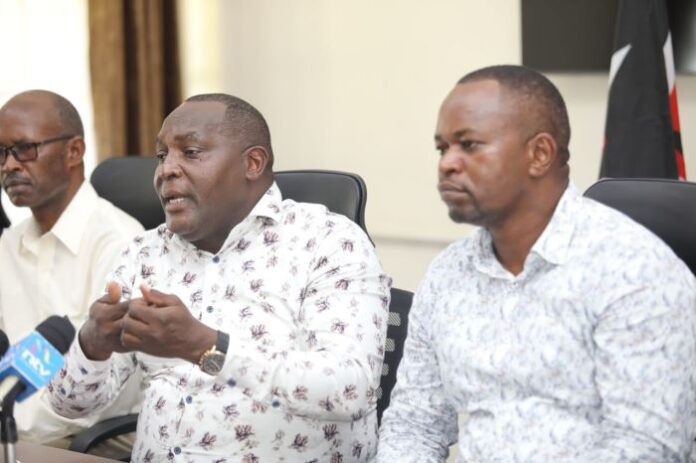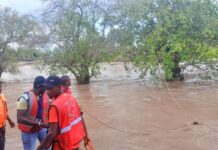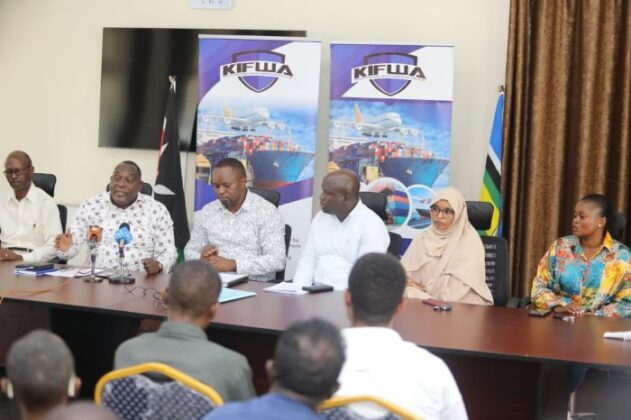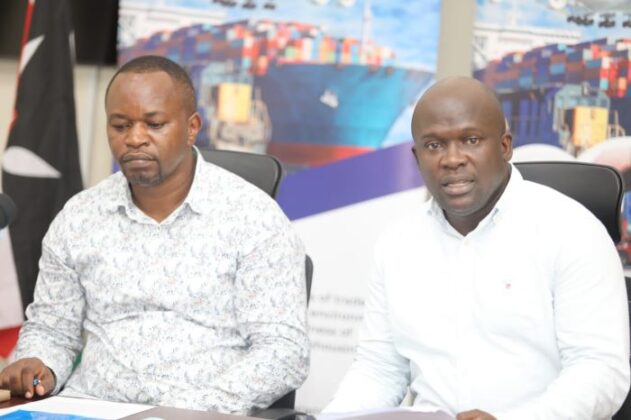
The Mombasa Port risks being congested following a new mandatory levy that has been introduced by South Sudan’s Customs Division.
Speaking during a press briefing in Mombasa, Kenya International Freight and Warehousing Association KIFWA) National Chair, Roy Mwanthi said there are currently more than 1,000 TEUs stuck at the port because of the mandatory Electronic Cargo Tracking Note (ECTN) that has been introduced by the South Sudan Revenue Authority for cargo destined for S.Sudan.
“The cargo is stuck due to an illegal directive issued by the commissioner of customs of South Sudan Revenue Authority (SSRA) that every container and every unit must pay USD350 as a levy for Electronic Cargo Tracking Number (ECTN),” said Mwanthi.
The mandatory ECTN service charge was introduced by S.Sudan Commissioner for Customs Division Brig. Gen. Aduot Ajang Aduot in the beginning of March this year following the signing of a Memorandum of Understanding between the government of South Sudan and Invesco Uganda Limited.
“All clearing agencies are hereby instructed to enforce these regulations through our partner Invesco Uganda Limited to ensure that all goods transiting through your respective states comply to the above regulations,” read a notice from the S.Sudan Commissioner dated 1st arch 2024.
However, KIFWA says the ECTN number S.Sudan is demanding serves no purpose except to collect money that is being paid to a private account in Uganda.
The Association says there is an existing Regional Electronic Cargo Tracking System (RECTS) that is a physical gadget affixed on containers and motor vehicles that tracks all transit cargo in real time and is free of charge.
“This ECTN will not track anything, will not see anything and will not be fixed anywhere thus will serve no purpose except to be a Non-Tarriff Barrier (NTB) to international trade and business. It is like an illegal roadblock erected to collect money for some individuals,” said KIFWA Mombasa Branch Chair Leonard Njiru.
In a letter addressed to the Commissioner for Customs and Border Control Department at the Kenya Revenue Authority, KIFWA called for intervention as Kenyan custom agents were being forced to collect the prerequisite ECTN charge which should be done by S.Sudan Customs.
“While we acknowledge that it is the prerogative of the government of S.Sudan to introduce any new process and/levies for their cargo, we are against using Kenyan agents for processing and collection of ECTN service charge or any other levies within Kenyan custom areas,” read the letter in part.
“Processing and collection of the ECTN service charge should be by S.Sudan Customs Agents and within S.Sudan custom areas of Juba, Elegu/Nimule, and Oraba/Kaya,” added the letter.
The Association now wants the Kenyan Custom Commissioner to give guidance to Kenyan customs officers to give final release for S.Sudan cargo without reference to S.Sudan customs release based on payment of ECTN fees by Kenya agents.
KIFWA says the collection of the mandatory ECTN charges is causing delays in movement of cargo.
“There’s already a crisis building up at the Busia and Malaba OSBPs due to truck delays as a result of enforcement of the directive, affecting truck turnaround time,” said KIFWA National Chair Roy Mwanthi.
They have called for the withdrawal of the directive failure to which they will seek legal measures.
“There is an extra 50USD/Unit or container charge being paid to an account in Kenya as Certificate of Destination for all consignment going to S.Sudan which is not founded in any East African Community law,” said KIFWA Mombasa Branch Chair Leonard Njiru.
The delay in cargo movement is causing huge losses to traders and businessmen in S.Sudan in terms of Port Storage charges, customs warehouse rent,and container demurrage charges.
Transporters are also facing the challenge of delayed movement of trucks which is affecting their turnaround time and delivery of essential commodities, like food items, medicine, indutry materials, to S.Sudan.
“Their cargo is stuck, it is a disadvantage to South Sudan and the earlier they can relocate the levy collection from Mombasa to an entry point in S.Sudan the better,” said Roy Mwanthi.














